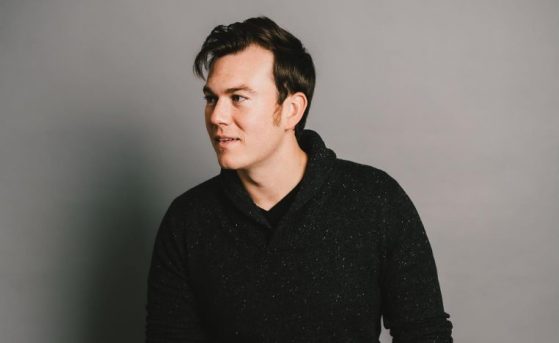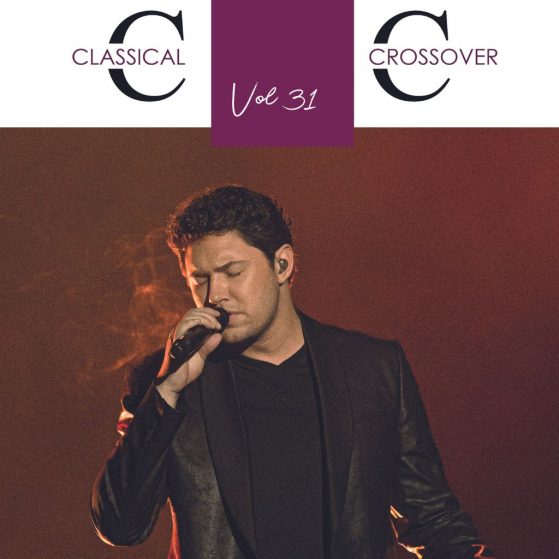
If you listen to the “This is John Riesen” playlist on Spotify you will find an extensive mix of standards, Broadway show tunes, and new works. His voice rings out with unabashed passion, thrilling in its heights during operatic selections, and has recently adopted a more gentle crooning when required.
John was a regional finalist and the Audience Choice Award winner in the Metropolitan Opera National Council Auditions and his extensive resume lists engagements with Knoxville Opera, Des Moines Metro Opera, Opera Birmingham, and many more.
A love for music was cultivated at the Riesen home. “My dad plays piano wonderfully,” John shared with us. “My mom did musicals in college and played the cello throughout high school and college… I grew up with my parents singing in harmony around the house for fun.” Although John’s siblings reportedly had “perfect pitch,” John saw himself as the odd man out, “Then there was me, the baseball player.” It wasn’t that John didn’t appreciate music, he did but claims, “When I would try to join in, I would quickly get told to stop because I couldn’t match pitch.” In high school, John’s grandmother gave each of her grandchildren some money for creative lessons. “My parents just thought ‘You should take voice lessons if you want to sing in tune.’”
The lessons did much more than that. John admits to being shy and unwilling to sing out, “I was nervous of what would happen if I was singing loud. Of course, it turns out, I have a really loud voice, you know, the operatic stage kind of loud voice. Things changed very quickly, once I got comfortable with that idea. I used my stamina and strength from my athletic career to inform how I learned to breathe because it’s all very similar between playing a sport and singing to me… Very quickly, I got good at it and I just started running down that path and didn’t stop till now.”
John wasn’t ready to choose between music and baseball and this desire led him to settle on Michigan State University. “I thought I could play on the team, and study with a Metropolitan opera singer, Richard Fracker, who was there as the head of voice.” Sadly, John realized this was impossible because each required “all of your time.” He said, “That was a rude awakening. In the fall, I missed practice, because of a mandatory music class… I went to the coach and I went to my voice teacher, and said, Well, what can I do? And they both said the same thing. Essentially, you can’t serve two masters, pick one and choose.”
John had a nearly full vocal scholarship and decided to stick with music, imagining he would still have the chance to play ball after graduating. As his studies continued, John’s voice revealed its true range, he moved from baritone to tenor and the doors began to open wide for him. “Suddenly, I was the lead in all the shows… it’s been funny looking back, because I know now as a 30-year-old, how challenging those roles are. You know Tales of Hoffman is a three-hour French Grand Opera that’s notoriously hard for the tenor and I did it at the age of 20. It was just fun. It didn’t scare me. It didn’t make me worry, stamina-wise, because that’s one of my gifts.” John says that while he would never assign a singer his age to cover this role he knows the opportunity came because “my teachers all saw that in me.”
John met his wife Gillian, a classical mezzo-soprano, while doing his first residency in Louisiana. They met during move-in day and although there was chemistry, both were conscious of keeping the focus on the music. They built a friendship and would go on long runs together, “I wanted to work out and impress her” but at least in that regard John had his work cut out for him as Gillian was a marathon runner. Audiences and friends immediately warmed to them as a couple. “I remember the opera company director, Steve Aiken, brought me into his office, he said, ‘Look, I’ve never said this before to an artist because I think it’s ridiculous but I truly mean this. You need to date Gillian, you two need to be a couple. I’ve never felt so strongly about two artists dating before. I usually think it’s a terrible idea but you need to do this.”
One particular night, Gillian and John were performing the love duet “Stranger in Paradise” from Kismet at a private party. Their acting was apparently very “believable” and John says, “I got taken aside by this man and he says, ‘Young man, I do not know you from Adam but you would be a fool not to pursue what’s in your heart for that young woman.’”
It seemed clear that their love was meant to be. “I finally asked her out and she looked at me and said, ‘Oh my God, finally I’ve been waiting.’” John and Gillian married and have one son together, “It’s just been heaven.”
The pair have turned out to be quite a musical power couple. Together they combined John’s knowledge about Spotify algorithms and playlists with Gillian’s expertise in photography, and web design to create an “ ecosystem” for artists. John has been prolific with releasing new music to the streaming giant and has nearly two million plays and 80,000+ monthly listeners. He has proved there is an audience for crossover and made others sit up and take notice.
Recording for this new medium has also made John more versatile. “My roots are such strong microphone-less singing on stage. For the last two years, I’ve been discovering what my voice does in a microphone just because onstage I’m very, very loud and I have a very powerful, colorful voice and that is too much to put into a microphone, especially in a song that’s meant to be elegant and sweet, because your ear pod is in your ear. You don’t need me to shout to hear it.”
John continues to perform live in various operas and concert performances that require him to utilize classical projection but he now has more options. “It’s such an interesting thing as an opera singer discovering that part of your voice as well… I really want to show that side of what I can do and take advantage of the technology that’s there. The microphone is making my life easy, so I wanted to lean into it.”
Classical crossover has long been viewed with suspicion by the classical community but John is passionate about presenting the genre in a positive light. Speaking of fellow artist Daniel Emment, John shared, “He said to me backstage at America’s Got Talent, ‘Crossover is the gateway drug to classical music’. That’s genius. That’s the best way to describe it.”








